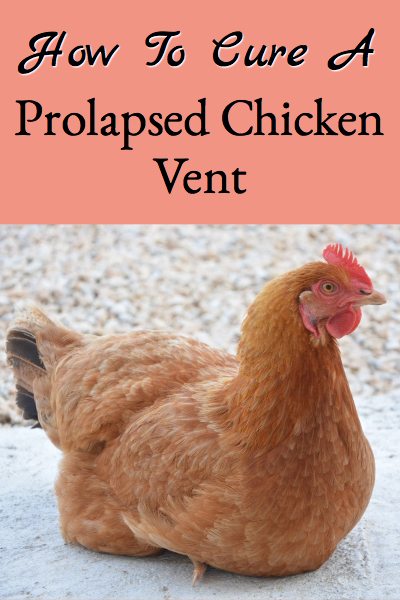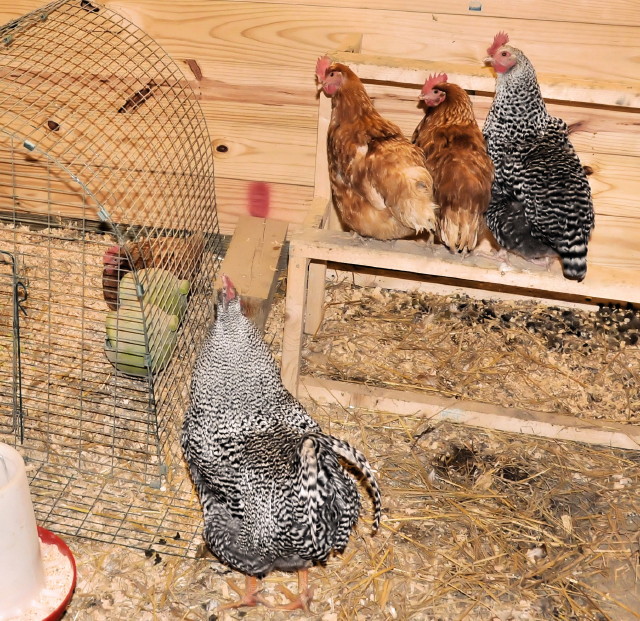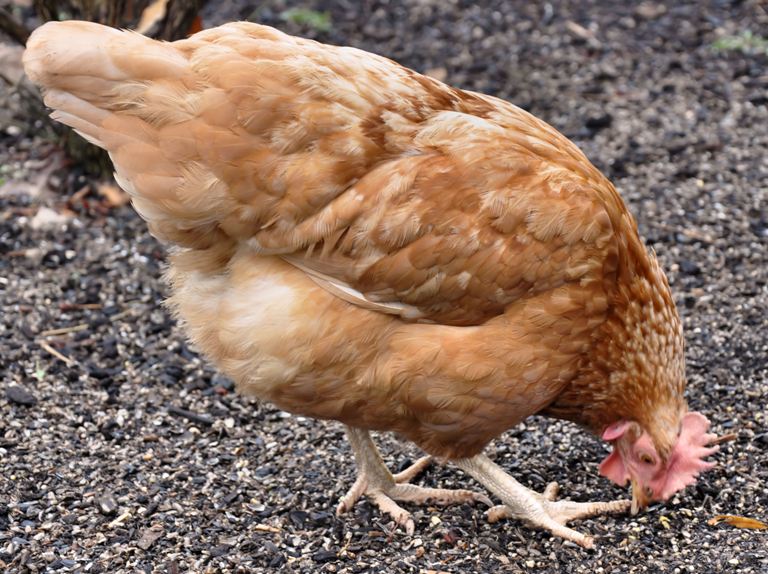Curing a prolapsed chicken vent is typically not as difficult as it may first appear – it often just takes 
One night, when I got home from work and opened the hen-house door, everyone popped out with their usual enthusiasm – except Gold Dust. She stayed huddled in a pile in the pen, and upon closer investigation, it was clear she had a problem.
Egg was stuck all over her tail feathers, and a mass of tissue was hanging from her egg vent. Pulling out Carla Emery’s Encyclopedia of Country Living, we quickly determined that Gold Dust had a prolapsed vent. The Encyclopedia says:
“Prolapsed Vent. This is most likely to happen to pullets who began to lay before they were fully grown. A mass of tissue will hang from the vent. It can be fixed more easily than it looks. Wash the protruding mass with warm water and a gentle antiseptic. Lubricate it with medicated Vaseline or mastitis ointment. Then push the prolapsed mass very gently back into the vent.
Isolate the recovering hen from the rest of the flock (which might be tempted toward cannibalism). Feed her drastically reduced rations for a week to slow up the egg laying. But supply plenty of fresh greens and water. Clean her vent area each day and apply ointment. By the end of the week she will probably be fine again and able to return to the flock. Later she will begin to lay normally. If, however, she prolapses repeatedly, turn her into stew.”

Gold Dust In Solitary
So, we isolated Gold Dust from the other chickens (to prevent any cannibalism), cut back her rations so she’d quit laying, and gave her lots of greens, grapes, and water. She laid eggs for three more days, and each day we’d have to push the vent back in place – but it wasn’t as badly prolapsed as the first time. We also cleaned her up each time with warm water and applied an antiseptic ointment (Preparation H will help cut down on the swelling).
Then, she quit laying and pretty much seemed back to her normal self. After about a week of this, we removed the isolating cage and let her mingle with the other chickens again. Gold Dust’s comb changed from red to pink, indicating she wasn’t laying anymore – but about two weeks later she started producing eggs again. She produced jumbo eggs before and after the prolapse, but she never prolapsed again. So, we didn’t have to turn her into stew!

Gold Dust Recovered from Prolapse
Patsy Reed says
I have a question. one if our silver lace hens has a huge sac hanging down between her legs, almost touches the ground and is very pink. either she is egg bound or prolapse. I squeamish about trying to push that back in. any advice?
Lesa says
Hi Patsy, Well, you’re going to need to do something for her, and I would suggest trying to push the sac back in. Good Luck!
blippity says
What would your advice be for a prolapsed vent in a (very) young chick? Noticed yesterday afternoon that she had a bit of firm stool protruding and when I picked her up instead of seeing fluffy butt I could see that her vent was protruding, slightly. Coloration was fine, no infection at this point just wondering how to get that little vent pushed back in there. My plan at this point is to soak her bum in warm epsom salts, then spray with antibiotic and use a q-tip/vaseline to try to gently push i back in then isolate her and give her limited feed with coconut oil mixed in and plenty of fresh water. Any advice?
Lesa says
Hi Blippity, That sounds like an excellent plan to me. Since she’s a growing chick, I would be careful as to limiting her feed too much. Hope she has a speedy recovery!
Pam Murphy says
I have a girl with a prolapsed vent. She was in the flock for a day or so before i noticed that her behind was more than just dirty. Was hoping it would resolve itself because the last time i tried to clean a vent the chicken died within seconds of cutting a dirty feather off but nite knew i had to do something! I have been soaking her twice a day keeping it moist with spray that i got at the feed store. Using antifungal & triple antibiotic! Held her for a few hours last nite and it seemed to stay in but out again this morning! How long do i do this before seeing a vet?
Lesa says
Hi Pam, I would keep trying for about a week, then go see the Vet. Good Luck!
Pam Torres says
I’m glad Gold Dust survived, she’s a lucky birdy. My question is this: is it normal, assuming the eggs is removed without much trauma, for the chicken to service? Do you have any sort of percentage? Also, once the chicken survives the first prolapse, how common is it to have it reoccur? Again, curious about any percentages.
Lesa says
Hi Pam, it is quite common that the chicken will survive a prolapse, but I don’t know what the percentages are 🙂
Olawoyin says
Good information